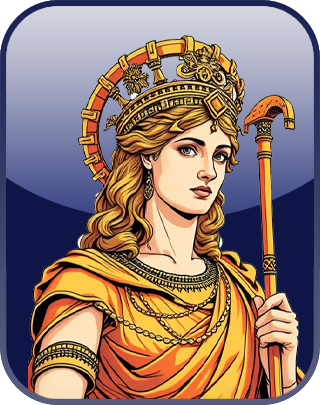Goddess Archetype Test
Which goddess archetype do you manifest?
The Goddess Archetype Test explores the dominant feminine archetypes shaping your personality and life path. Drawing on Peggy A. Hudson's 2004 doctoral thesis, Measurement of the Dominant Goddess Archetypes, and Jean Shinoda Bolen's influential work, Goddesses in Everywoman (1985), this test connects ancient mythology to modern psychology.
Each goddess archetype—such as Athena, Aphrodite, or Demeter—represents unique qualities and behaviors that influence relationships, careers, and self-perception. By identifying your primary archetype, the test offers insights into your inner strengths, challenges, and growth potential, helping you align more authentically with your true self and live a balanced, meaningful life.
Question 1 of 35
I feel most fulfilled when I am in a committed relationship.
| Disagree | Agree |
NEXT
The IDRLabs Goddess Archetype Test is based on the work of the doctoral thesis of Peggy A. Hudson and the writings of Jean Shinoda Bolen.
The test provides feedback such as the following:
Artemis (Virgin Goddess)
The Artemis archetype embodies the independent feminine spirit, enabling women to achieve their goals and define their identity on their own terms. She symbolizes self-reliance and values personal accomplishments over societal expectations like marriage, finding fulfillment without needing a partner. Artemis is highly focused, driven, and passionate about her beliefs, often advocating for women's rights and the protection of the vulnerable. Nontraditional in nature, she values equality with men and a deep connection with other women. However, Artemis may exhibit emotional detachment, prioritizing her ambitions over the feelings of those around her, sometimes leading to cruelty if she perceives weakness in others.
Athena (Virgin Goddess)
Athena represents wisdom, logic, and strategic thinking, characterized by her reliance on intellect over emotion. Women aligned with the Athena archetype prioritize their goals, displaying practicality, professionalism, and emotional resilience. Known as a "father's daughter," Athena supports traditional structures, thrives on knowledge, and remains objective and disciplined. While highly capable and well-defended, Athena's emotional distance prevents her from experiencing intense passions or profound suffering. Her moderation and logical approach help her navigate challenges effectively but may leave her disconnected from deeper emotional experiences.
Hestia (Virgin Goddess)
Hestia symbolizes inner wisdom, spirituality, and tranquility, representing a woman’s intuitive and centered self. She seeks solitude, values introspection, and finds meaning through inner peace rather than external validation. Hestia women exhibit compassion and emotional detachment, often embracing a calm, wise demeanor. Their undemonstrative nature may make their feelings and inner life a mystery to others. Grounded and serene, they are deeply connected to their spirituality and live with a quiet sense of purpose, embodying the principle that "still waters run deep."
Hera (Vulnerable Goddess)
Hera represents the archetype of the wife, seeking fulfillment through partnership. Women embodying Hera are loyal, committed, and devoted to their partners but may feel incomplete without a relationship. Hera women can experience intense joy or pain depending on their relational success, often struggling with unmet expectations if their partners fail to fulfill their desires. They tend to prioritize their relationships with men over friendships with women, which can leave them isolated. When betrayed, Hera women may react with anger or vindictiveness, highlighting the powerful emotional force of this archetype.
Demeter (Vulnerable Goddess)
Demeter is the archetype of the nurturer, characterized by her maternal instinct and deep desire to care for others. Women with a strong Demeter archetype are generous, dependable, and altruistic, often embodying the qualities of an "Earth Mother." While nurturing and selfless, Demeter women struggle with boundaries and may overextend themselves, leading to exhaustion or passive-aggressive tendencies. Their strong need to support others can leave them vulnerable to being taken advantage of, but their integrity and grounded nature make them a steady presence in the lives of those they care for.
Persephone (Vulnerable Goddess)
The Persephone archetype reflects passivity, compliance, and a sense of waiting for transformation. Women with this archetype often exhibit youthful, indecisive, and adaptable qualities, lacking a clear sense of identity or ambition. Easily influenced by others, they may feel powerless or dependent, sometimes resorting to manipulation to meet their needs. Persephone represents the archetype of the "maiden," embodying inexperience and untapped potential. While this archetype can signify immaturity, it also holds the promise of growth and self-discovery.
Aphrodite (Alchemical Goddess)
Aphrodite is the archetype of love, beauty, and sensuality, blending the desire for relationships with the ability to maintain independence. Unlike other archetypes, she balances emotional intimacy with autonomy, valuing the depth of personal experiences over permanence or detachment. Aphrodite women are magnetic and charismatic, often drawing people in through their vibrant personalities rather than physical appearance alone. Extraverted and spontaneous, they radiate a love for life and often have a wide social circle. However, their charm may evoke mistrust or envy from other women, even as they inspire admiration and enjoyment of their warm, attentive nature.
The Goddess Archetype Test is inspired by research into relevant literature and methodological practices. While the Goddess Archetype quiz is inspired by fields of research, it cannot be used to provide clinical assessments or an accurate evaluation of your personality. Clinical assessments should always be done in cooperation with a mental health professional. For more information about any of our online tests and quizzes, please consult our Terms of Service.
References
- Peggy A. Hudson. Measurement of the dominant goddess archetypes // Doctoral thesis, 2004
- Jean Shinoda Bolen. Goddesses in Everywoman. Harper, 1985

